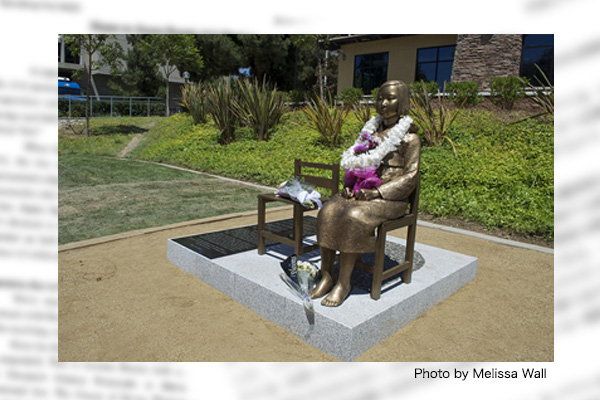On April 27, the Japanese government made important cabinet decisions on comfort women and wartime Korean workers issues. It concluded the word “wartime comfort women” as inappropriate even if it is accompanied by the word “so-called.” The cabinet also decided that the word “forced taking” or “forced labor” regarding wartime Korean workers in Japan is inappropriate.
Inappropriate even if “so-called” is attached
Last year, the education ministry approved Yamakawa Shuppansha Ltd.’s history textbook for junior high schools, which used the word “so-called wartime comfort women.” The previous Shinzo Abe administration decided that a school textbook should reflect government official views including cabinet decisions, leading Japan’s position on territorial issues to be written more clearly in school text books. Regarding comfort women, the Yamakawa’s textbook passed the screening because a statement by then Chief Cabinet Secretary Yohei Kono in 1993 used the word “the issue of wartime ‘comfort women’.”
The word used before the end of World War II was a simple “comfort women” instead of “wartime comfort women” that was created after the war. Recently, the coined word has not been used in academic or government documents because the word “wartime” could imply coercive or forced taking. A cabinet decision was viewed as effective for eliminating the word from school textbooks at the next textbook screening.
In a written question submitted on April 16, House of Representatives lawmaker Nobuyuki Baba from the Japan Innovation Party asked if it would be inappropriate for the government to combine “wartime” with “comfort women” into “wartime comfort women,” “so-called wartime comfort women” or “serving on wartime duty as comfort women.”
In response, the cabinet under Prime Minister Yoshihide Suga on April 27 decided to answer that it is appropriate to use the simple term “comfort women” instead of “wartime comfort women” or “so-called wartime comfort women” because “wartime comfort women” could lead to misunderstanding. It also decided to keep from combining “wartime” with “comfort women” in a manner to lead to misunderstanding.
“Forced taking” regarding Korean workers is also inappropriate
Lawmaker Baba submitted another written question asking if it is inappropriate to use the word “forced taking” or “forced labor” regarding wartime Korean workers in Japan. In response, the cabinet on April 27 decided to answer that as Korean workers immigrated into Japan for various reasons, it is not appropriate to uniformly describe them as having been “forcibly taken” to Japan. As for the immigration of Korean workers requisitioned under Japan’s National Requisition Ordinance before the end of the war, it is appropriate to use the word “requisitioned” instead of “forcibly taken” or “taken.” As the government interprets labor provided through “recruitment,” “official mediation” and “requisition” as differing from “forced labor” under the Convention Concerning Forced or Compulsory Labor, it is inappropriate to describe it as “forced labor,” the decision said.
The two cabinet decisions will lead “wartime comfort women,” “forced taking” and “forced labor” known as anti-Japan words to be expelled from school textbooks. I would like to highly appreciate the resolute attitude of the Suga administration.
Tsutomu Nishioka is a senior fellow and a Planning Committee member at the Japan Institute for National Fundamentals and a visiting professor at Reitaku University. He covers South and North Koreas.


